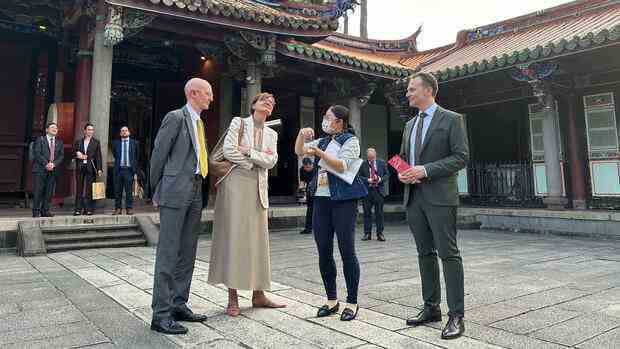Taipei, Berlin It was the most delicate trip of Research Minister Bettina Stark-Watzinger’s (FDP) term. In a brightly colored bus, she has been driving non-stop through Taiwan for the past two days.
China, which lays claim to the island nation, sees trips by Western politicians to Taiwan as an affront. The state leadership has expressed criticism – but not beyond the normal level. Stark-Watzinger has repeatedly avoided questions about the political significance of the trip – also in conversation with the Handelsblatt, for which she still took time on Wednesday night.
“Of course it attracted attention that for the first time in 26 years a member of the federal government traveled to Taiwan,” said the FDP politician. But the visit to Taipei was a “completely normal trip” and entirely within the framework of the one-China policy that the federal government is pursuing. A “professional exchange between the value partner Taiwan and Germany”.
It should not be the research minister’s only trip to the region. Stark-Watzinger also wants to promote research collaborations with other Asian countries. Last year she was in Australia, this year the meeting of the G7 science ministers will take place in Japan. South Korea is also considering Stark-Watzinger, where the semiconductor industry and research is strong. “This year is all about innovation and transfer,” she says.
Behind this is the desire for a broader positioning, including that of science. Stark-Watzinger warns that Chancellor Olaf Scholz’s much-cited appeal to German industry not to “throw all your eggs in one basket” with regard to China also applies to science and research. Germany must broaden its international cooperation overall in order to become more sovereign.
>> Read also here: Hardliner and Xi confidante – This is the new Chinese foreign minister
“China is increasingly becoming a competitor and systemic rival. That’s why we shouldn’t just look at Western countries like Canada, but also have to step up exchanges with value partners in Asia who have the same standards in terms of the rule of law and academic freedom.” With its excellent basic research, Germany is a partner that is in demand worldwide.
Stark-Watzinger warns companies against short-sighted engagement in China
The liberal minister also sees German companies as having a responsibility. In recent years, more and more corporations have invested a lot of money in their research and development in China, such as the German car manufacturers. The supplier Bosch recently announced an investment of almost one billion euros in the Suzhou location.
“Of course, it is a free company decision as to where research is carried out,” said Stark-Watzinger in an interview with the Handelsblatt. “But I can only warn against short-sightedness and new dependencies in view of the turning point in time.”
Autocratically led China also still plays a dominant role in research cooperation, which is viewed increasingly critically. According to current information from the university conference, there are around 1,400 partnerships between German and Chinese universities. The scientific exchange organization DAAD also continues to be closely interlinked.
>> Read also here: Study – China is the most important industrial research location in the world
“Interest in cooperation with Chinese partners remains high, but at the same time we are experiencing increasing uncertainty at many universities in dealing with existing cooperation and a certain reluctance to initiate new cooperation,” says the head of the DAAD’s Competence Center for International Academic Cooperation (Kiwi). Friederike Schroeder. But this does not only refer to the geopolitical situation.
Minister Stark-Watzinger makes a clear appeal to German research: “I hope that the sensitivity at universities and research institutions will continue to increase,” she says, referring to China. “We have academic freedom, but that’s not the case everywhere in the world.” Universities that are unsure about dealing with China can now also seek advice from the China experts at the Ministry of Research.
The research minister was the first member of the federal government in Taiwan in 26 years.
(Photo: dpa)
Stark-Watzinger has observed that the institutions clearly have more need for discussion than before and are more aware of the risks of cooperation with China. The main issues are dual-use goods that can also be used militarily, data laws and political influence on Chinese scientists. “My impression is that not only is perception changing, but that people are also dealing with it differently.”
China’s head of state and party leader Xi Jinping has been pushing the merging of military and civilian research for years. He greatly expanded the influence of the KP – also in science. As early as the summer of 2022, Stark-Watzinger had warned German universities against further cooperation with the Confucius Institutes financed and directed by Beijing, some of which have made massive attempts to influence the universities.
Secret meeting at chip manufacturer TSMC?
Shortly before the return flight, Stark-Watzinger left for an appointment that is not on the official schedule: Instead of the colorful bus, a black van with leather seats took them there. It would be obvious that she uses the last hours of her stay to talk to one of the best semiconductor manufacturers in the world: TSMC. There has been speculation for months that the Taiwanese company could open a plant in Dresden.
Asked directly whether she was visiting TSMC, Stark-Watzinger evaded: “There are also appointments that are outside of what one needs to talk about.” A Taiwanese official is more willing to provide information: The visit went “greatly”. He doesn’t want to say more either. TSMC did not respond to the Handelsblatt request.
For Stark-Watzinger, the trip was just a starting point. The research cooperation between Taiwan and Germany, which was finalized during her visit, was an important step. Existing projects, for example for battery research, are now to be expanded. Cooperation in the fields of hydrogen and microelectronics should also progress together.
More: These four scenarios are debated in Taiwan conflict
